MOST RECENT ACTIONS & Updates
March 2024
- March 21 - the sump installation is complete, and the gas collection system is back online.
- March 20 - The expected replacement of a sump is in process. This requires the gas collection system to be shut down for several hours. Depending on weather conditions, residents may experience odors while the system is offline.
- March 18 - ACUA will be replacing a sump on Wednesday, March 20, that will require the gas collection system to go offline as work is completed. Depending on weather conditions, residents may experience odors while the system is offline. The new sump will reduce water from infiltrating the vacuum system.
- March 13 - The new header pipe has been installed, and the gas collection system is back online. The wellfield will be adjusted over the next few days to optimize gas collection efficiency.
- March 12 - Expected work to the header is in process. This required the gas collection system to be shut down for several hours. The system is expected to go offline again for approximately 8 a.m. to 1 p.m. on March 13.
.jpg.aspx)
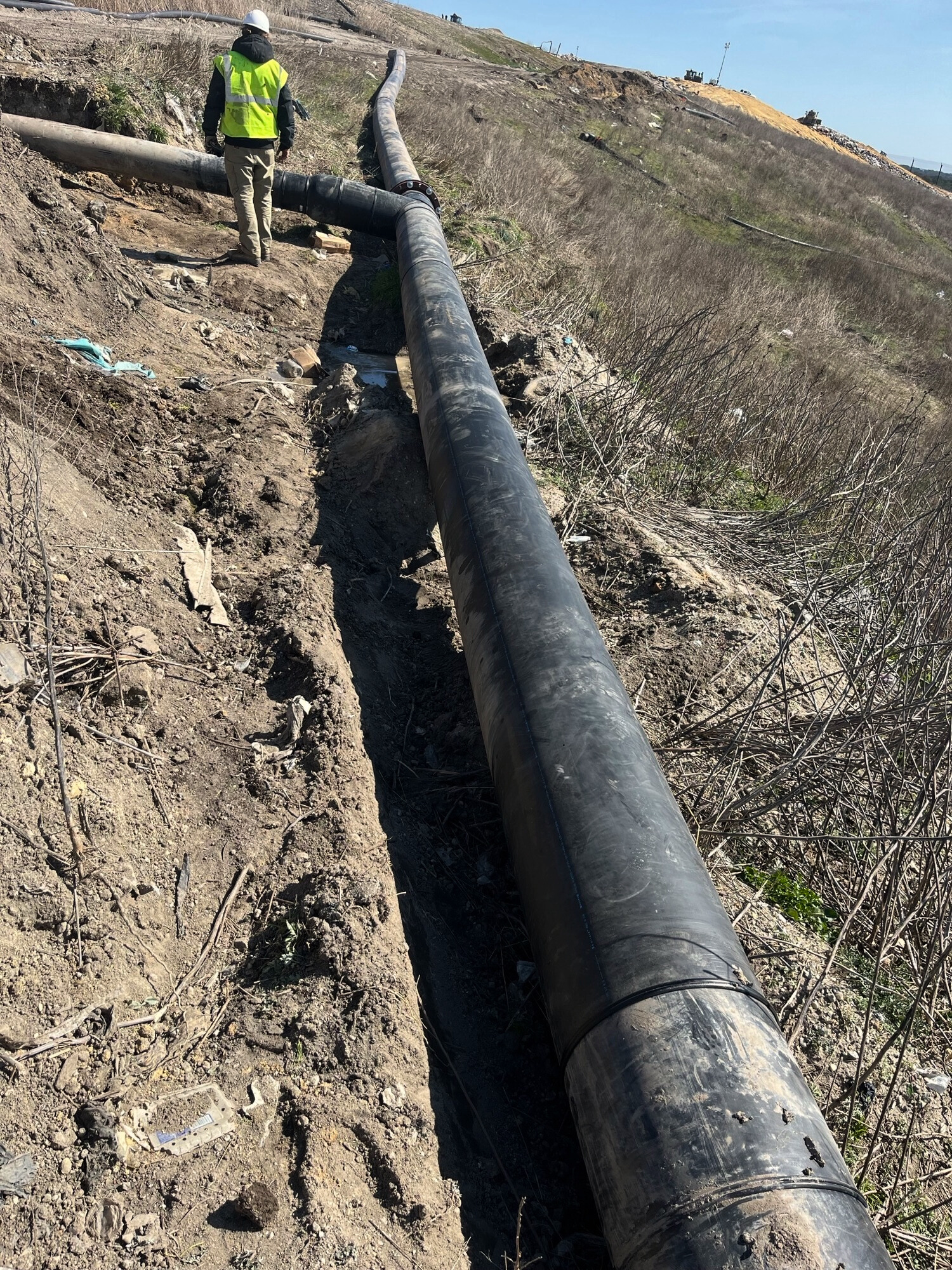
- March 11 - ACUA expects to perform necessary upgrades to its landfill gas collection system on Tuesday, March 12, and Wednesday, March 13, 2024, that may impact odors. The gas collection header pipe, which will increase gas collection capacity, is being replaced and connected to the existing gas collection system. To complete this work, the collection system will need to go offline periodically on March 12 and 13. Depending on weather conditions, residents may experience odors while the system is offline.
- March 4 – heavy rainfall from Saturday, March 2, infiltrated the collection system and led to a temporary increase in odors. Additional rainfall is expected throughout the week. Currently, ACUA staff manually removes liquids through pumps and other measures. New wellheads are expected to be installed during the second quarter of 2024, which will remove liquids automatically and improve gas collection/decrease odors related to heavy rainfall.
- March 1 - a small disconnection between pipes caused a decrease in gas collection between 1:30 and 5 a.m. The pipeline has since been reconnected.
February 2024
- February 29 - new header pipe has been installed, and the new wells will be connected to it in early March. The new header pipe will increase gas collection capacity.
- February 1 - 19 wells have been connected to the system.
January 2024
- January 25 - 19 gas wells have been installed. 17 have been connected to the system. The remaining 2 will be connected within the next week. 2 wells intended for installation were removed from the project due to accessibility issues.
- January 11 - 13 of the 15 installed wells have been connected to the system. 2 of the 6 additional wells have been installed.
- January 10 - Heavy winds damaged the temporary cap. All 15 new gas wells are installed. Based on existing site conditions, it was determined that an additional 6 wells will be added to this current installation project.
- January 8 - 14 of the 15 gas wells have been installed.
- January 4 - 7 of the newly installed gas wells have been hooked up to the gas collection system.
December 2023
- December 29 - 5 of the newly installed gas wells have been hooked up to the gas collection system.
- December 22 - 11 of the 15 gas wells have been installed. The temporary cap has been repaired.
- December 19 - 7 of the 15 gas wells have been installed.
- December 18 - Rain and high winds damaged the temporary cap. Repairs will occur later this week.
- December 16 - 5 of the 15 gas wells have been installed.
- December 11 - Drilling begins on 15 additional gas well installations. As wells are installed, there may be a slight increase in odors caused by this activity. This is temporary and will dissipate as wells are connected to the landfill gas collection system.
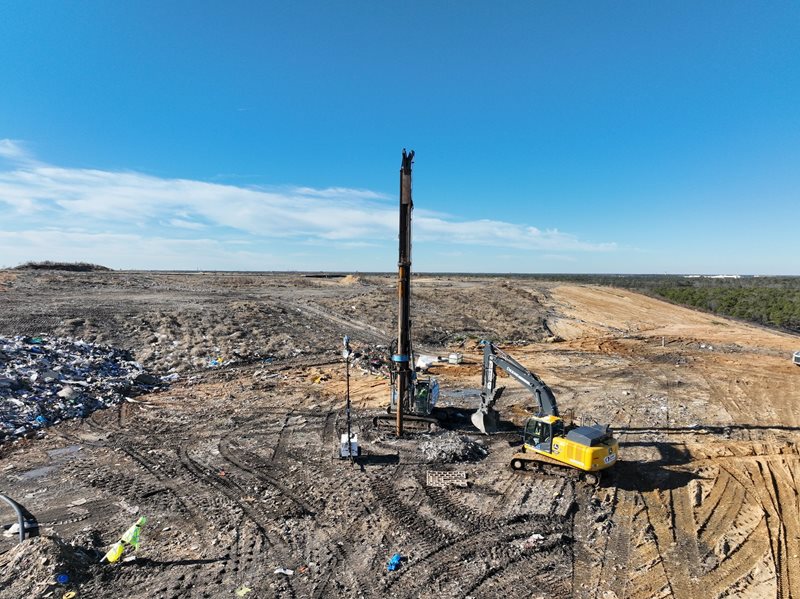 November 2023
November 2023
ACUA is working with partners OPAL Fuels and South Jersey Gas to improve gas collection efficiencies.
- November 16 - ACUA completes installation of 4,000 ft. of landfill gas pipeline and connected nine gas wells.
October 2023
ACUA tuned and cleaned several gas wells to increase gas collection in its current wellfield. We began replacing media in our hydrogen sulfide (H2S) tanks that absorbs the gas. This replacement happens every 6-12 months as needed. Additional gas well installations (15) are being scheduled and will be installed by end of year. Groundbreaking on the RNG Project took place, and work on the wellfield leading up to the construction has begun.
How We Control Landfill Odors
While it is difficult to eliminate all odors from a landfill, there are many industry-proven ways ACUA works to prevent and minimize them. These include:

Landfill Gas Collection System
The most significant measure in containing odors is ACUA’s landfill gas collection system. The system uses a series of wells to capture gases from decomposing trash. ACUA first began collecting landfill gas in 2003 with 19 collection wells. Today, there are more than 100 active wells installed throughout the landfill. As active areas fill with trash, more wells are installed to capture the increasing gases. This system is constantly monitored, tweaked, and cleaned to ensure efficiency.
Once the gases are collected, they are directed to one endpoint. H2S gases are absorbed using a special media in-vessel treatment system that binds to and removes sulfur gas. The remaining collected gases are safely burned off using an enclosed flare. The burning of landfill gas reduces greenhouse gas emissions by converting methane into CO2.
ACUA previously captured gas and converted it into electricity through a third-party partnership. That project saved ratepayers more than $8.5 million while in operation and prevented more than 25,602 metric tons of CO2 from entering the atmosphere.
Today, construction is underway on a more efficient system that will convert the captured landfill gas to pipeline-quality natural gas. This
renewable natural gas, or RNG, can be used to fuel area homes, businesses, and compressed natural gas vehicles. The project is a partnership with South Jersey Industries and OPAL Fuels and will be the first of its kind in South Jersey. Most landfills generate gases up to 30 years after a landfill closes, so the project is expected to provide renewable energy for many years to come.
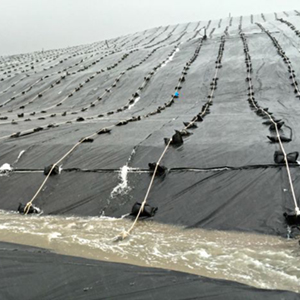
Cover and Capping
Every day, a thick layer of dirt is applied over areas where trash is being actively buried. A minimum of six inches of daily cover is required, which provides the necessary protection and helps to prevent odors, litter, and erosion.
When areas are no longer active, but not quite ready for permanent closure, ACUA applies intermediate cover, which must be at least 12 inches thick. ACUA also uses a more protective “posi-shell” cover and has installed a temporary cap over these areas when applicable. Currently, 20 acres of the ACUA landfill are temporarily capped or covered.
The landfill can be permanently capped once areas are no longer active or under construction. Currently, 20 acres of the ACUA landfill are permanently capped and ACUA plans to permanently cap an additional 16.7 acres in the 2024.
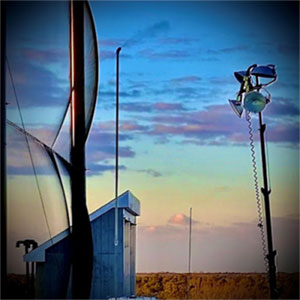
Neutralene Vapor System Installation
To further neutralize odors, neutralene vapor misters are installed along active landfill cells. Neutralene is a non-toxic substance that absorbs and breaks down odor compounds.
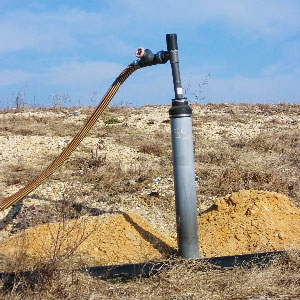
Monitoring
ACUA staff and third-party consultants continually monitor conditions at the landfill to ensure compliance with state environmental requirements. This includes:
Daily Odor Monitoring
The New Jersey Department of Environmental Protection (NJDEP) requires daily odor monitoring at the fence line of the property according to wind direction. If this odor reaches 30 parts per billion (PPB) of H2S, then additional monitoring is required.
Off-site Odor Monitoring
In addition to required testing, ACUA performs odor testing at 11 points located outside of the facility.
Daily Monitoring of Gas Wells
ACUA staff continually monitors the landfill wells to ensure they are properly collecting gas at a target flow rate of 2100 standard cubic feet per minute (SCFM). Lower readings indicate a line may need to be cleaned, repaired or regraded.
Quarterly Surface Emissions Testing
This required testing measures methane levels at the landfill surface and all landfill penetrations. If methane exceeds 500 parts per million, ACUA receives notice from its third-party vendor and must address any exceedance within 10 days. An additional follow up test is performed at 30 days to ensure that the repair was completed and is not temporary.
Daily Cover Inspections
ACUA staff ensures the correct amount of cover is applied on all active surfaces.
Enclosed Flare Stack Testing
ACUA is required to test emissions from its flare every five years. ACUA passed its most recent stack test in July 2023.
Historical Investment in Odor Control
ACUA installed its landfill gas collection system in 2003 and has made significant improvements and investments in the 20 years since. Throughout this time, more than $15 million has been devoted to odor control improvements.
A permanent cap was installed across 20 acres of the landfill in 2010, and an additional 20 acres received a temporary cap in 2015. These multimillion-dollar investments continue to play an integral role in controlling odors. Plans to permanently cap an additional 18 acres of landfill space are underway for 2024.
Throughout the years, ACUA has consistently invested in key infrastructure that contributes to the efficient collection of landfill gas. Its flare system was upgraded in 2010 and again in 2017. In 2017, a H2S removal system was also installed. Each year, ACUA invests thousands of dollars into new gas well installations and maintenance measures.
ACUA remains committed to exploring all opportunities to efficiently collect gas and reduce odors.
$15 million
Total Investment in Odor Control
199
Total Gas Well Installations
110
Total Active Gas Well Installations*
*Wells can be decommissioned as the landfill grows
Data current as of October 2023
MAILING LIST
Sign up by email to receive information on projects and activities related to landfill gas and odor control.
REPORT AN Odor
The ACUA takes seriously all odor complaints and is committed to being a good neighbor to the surrounding community. Odor issues can be reported through the form below or by calling us at 609.272.6950.
| Solid Waste Odor Complaint |